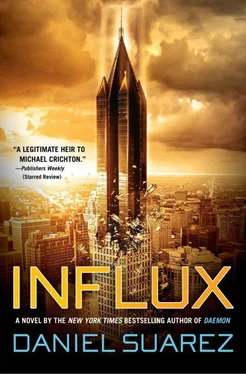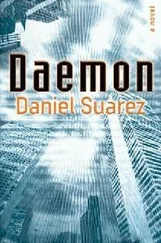They high-fived one another, shouting with joy, and clinked together what appeared to be large bottles of beer. They danced around, arm in arm like devils before a fire, their shadows cavorting along the walls.
Marrano shouted, “Hey! What the hell, guys?”
The men stopped and looked to the doorway. The one with the paintball mask flipped it up to reveal a youthful bearded face. He smiled and raised a half-empty malt liquor bottle. “Marrano! Just in time. Check this out.”
Marrano sighed in irritation as he, Johnson, and Kulkarni gingerly navigated around broken glass and pools of liquid. He frowned. “This place is a mess, Mr. Grady.”
“Maid’s on vacation. Get on over here.”
The other researchers stood alongside Grady, all wearing blue coveralls with a white number forty-one embroidered over the chest pocket. Two were young Asian men—one of them plump but tall, the other wiry like a wrestler. Next to them was a scholarly looking Caucasian man in his seventies or eighties, wearing a sweater and necktie beneath his loose-fitting blue coveralls. He leaned on a cane, visibly guarded about the new visitors.
Marrano gestured as they made their way closer. “Jon Grady, this is Doctor Sameer Kulkarni, Princeton University plasma physics lab. He’s here to evaluate”—his eyes trailed up the towering assembly—“whatever the hell this is.”
“Doctor Kulkarni, great to meet you.” Grady waved them in with welding-gloved hands. He gestured to his team. “That burly guy over there is Raharjo Perkasa, postdoc out of Jersey Tech. That’s Michael Lum, our chemical engineer from Rutgers.”
Both the young men nodded.
“And over here—”
Kulkarni was distracted momentarily as he bumped against an origami polyhedron on a nearby table—but then he took notice of the fourth researcher. “Doctor Alcot. Bertrand Alcot.” He laughed. “What on earth are you doing here? How long has it been?”
The elderly Alcot smiled as they shook hands heartily. “A good five or six years, I think.”
Marrano and Johnson exchanged looks. “You know each other?”
Kulkarni nodded. “Doctor Alcot and I coauthored a paper on hydrodynamics long ago. While he was at Columbia. I thought you retired, Bert.”
Alcot nodded. “From the university, yes. I was encouraged to retire. So I did.”
Kulkarni seemed to be trying to recall something. “The last thing I read of yours was…” He hesitated. “Well, it was rather controversial, if I remember.”
“That’s diplomatic of you. It was a paper on modified Newtonian dynamics.”
There was an awkward silence.
Grady spoke as he tapped away at a computer keyboard. “Doctor Alcot’s career difficulties are my fault, I’m afraid. I’ve been told I’m a bad influence.”
“You are a bad influence.” Alcot gestured to Grady. “He’s been pestering me for years with his strange ideas.”
Grady snorted as he studied the numbers on his computer screen.
Alcot continued, “I tried mathematically disproving Jon’s theories but couldn’t.” He leaned back on his cane. “After Greta passed away, Jon convinced me to come join him here.”
“My condolences on Greta. I hadn’t heard. When did she pass, Bert?”
“About two years ago now.”
“So sorry to hear it.” Kulkarni glanced back to Grady. “Then Mr. Grady worked with you at Columbia?”
Grady shook his head, still studying the computer monitor. “Heh. I’m no scholar. I flunked out of a state college.”
Alcot added. “Jon has a master’s in physics.” He paused and somewhat sheepishly added, “An online degree.”
“Ah, I see. Then how did you two…?”
“Jon’s been emailing me for years. Incredibly persistent. Got to the point I could no longer ignore him. It was either that or a restraining order.” Alcot gestured to the towering assembly. “This is the result.”
Kulkarni looked to Marrano, then back to Alcot. “Then it was Mr. Grady who formed the company?”
“Yes.”
“With other people’s money.” Marrano picked up one of several origami geometric shapes from a nearby table. He gazed at the researchers meaningfully. “I haven’t heard anyone mention chiral superconductors yet.”
Grady answered as his fingers clattered at the keyboard. “Do you even know what chiral superconductors are, Mr. Marrano?”
“No, and it’s not for lack of trying. But I do know the government invested in this place. So someone somewhere must understand it.”
Grady smiled. “And thus marches Wall Street.”
Marrano tossed the paper model aside and turned back to Kulkarni. “Can you please find out what’s going on? I’d like to get back to the city.”
Johnson eyed the large bottles of cheap beer in the researchers’ hands. “You guys always drink while you’re messing around with high-voltage equipment?”
Alcot gave the barest hint of a smile. “We’re celebrating.”
Again Grady barely looked up from his keyboard as he answered for Alcot. “Bert’s right. Tonight is a special night. As you’ll see.” He finished typing, then looked up to regard them. “I’m guessing you’ll all need a drink soon enough.”
Marrano and Johnson exchanged unimpressed looks. “What’s the forty-one stand for?” Marrano gestured to the number on the researchers’ coveralls.
Grady tossed his paintball mask onto a nearby tool cart. He now looked like a BMW mechanic in blue coveralls. He pulled back his unruly, shoulder-length hair, wrapping it into a ponytail as he spoke. “Forty-one represents a starting point. Prime numbers are the atoms of mathematics. Viewed on an equilateral grid, the number forty-one appears at the very center of all the prime numbers below one hundred. And if we consider de Polignac’s conjecture, the fractal nature of that numerical array has tremendous significance at higher scales.”
“Jesus…” Marrano and Johnson again exchanged looks.
Alcot interceded. “I’ll grant you that Jon has some eccentricities, gentlemen, but I’ve begun to realize that he simply has a different perspective on things.”
Marrano gazed at the dozens of origami shapes scattered among electrical components on nearby tables. “That’s a shocker.”
Alcot picked up one of the shapes. “Non-Euclidean curved surface folding. Jon sometimes thinks through problems with his hands.”
“It helps with certain problem sets.” Grady approached them, apparently noticing the dubious look on the investor’s faces. “It’s fair to say I’ve strayed a bit from my business plan.”
Marrano scowled. “Strayed? I can’t even see your business plan from here. I’ve been going through your expenses. You’ve blown through half your annual budget in the last three months on utility bills alone.”
“An opportunity cost.” Grady gestured to the towering apparatus. “High energies are necessary to induce exotic states in baryonic matter. And exotic states are what we needed.”
“I’m guessing your burn rate is the real reason we’re here.” Marrano gestured to the massive tower of equipment. “Is this your Hail Mary pass before you go under? And what the hell is baryonic matter?”
“Physical stuff —for our purposes at subatomic scales.” He looked to Kulkarni. “Doctor Alcot and I have been studying the interaction of high-energy particles moving through doped graphene within superfluids like helium-4.”
Kulkarni nodded uncertainly. “Okay. And how does that relate to chiral superconductors, Mr. Grady?”
There was a pause.
“It doesn’t.”
There was a tense silence.
“But I could get funding for chiral superconductors.”
“That’s fraud.”
“ Fraud ’s an ugly word. Anyone reading the business plan able to comprehend our mathematics would clearly understand what I was proposing.”
Читать дальше












